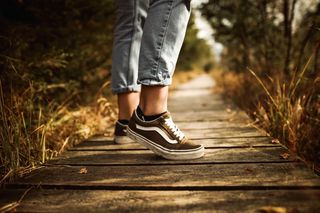Body Image
Want to Improve Your Body Image? Head Outside.
Research reveals that time in green spaces creates a more positive body image.
Posted March 5, 2018

Researchers have long sought methods for aiding those who struggle with body image. Cognitive behavioral therapy can help, as can exercise, self-compassion, and learning to fight back against unrealistic cultural beauty ideals. But researchers from the U.K. recently tested a relatively novel approach to improving body image. In an article published this month in the journal Body Image, Viren Swami, David Barron, and Adrian Furnham demonstrate that spending time in green spaces (or even just looking at photos of green spaces) can result in a more positive body image. Although a handful of earlier studies have shown a correlational link between spending time in nature and positive body image, researchers had yet to demonstrate a causal path between these two variables. In other words, people who spent more time in nature reported more positive body attitudes, but it was not clear that time in nature actually caused those attitudes.
The authors conducted a series of studies to test the hypothesis that exposure to nature would increase feelings of positive body image. Positive body image is more than just not feeling bad about your body. It's about respecting your body and appreciating what it does for you. It includes embracing broader conceptualizations of beauty and rejecting negative influences on body image.
In the first study, researchers randomly assigned Cambridge University students to either view 25 images of nature scenes or 25 images of urban, built environments. Students viewed each image for 7 seconds. Viewing nature images significantly increased body satisfaction for both men and women; viewing urban images had no effect on body satisfaction. In a second and third study using similar methodology, researchers found that viewing the nature images also increased body appreciation, a key component of positive body image. High body appreciation scores indicate that participants tended to agree with statements like, “I respect my body,” and “I am comfortable in my body.”

In a fourth study, the researchers tackled the question of whether actually walking around in a natural environment would have similar (and potentially bigger) effects on body image. Adults living in London (ranging in age from 18 to 65) were asked to participate in a study of “health and mobility.” (Researchers described the study this way to avoid giving away their hypothesis about body image.) In order to rule out possible effects of bad weather, the researchers ran the study only on clear days between April and September. Participants were randomly assigned to either take a half-hour walk in a built, urban environment (high-rise housing blocks, offices, shops, and parking lots) or in a natural environment (Hampstead Heath—featuring woodlands, ponds, and grassy landscapes). They were given a map to follow to make sure they stayed on course. Walking in an urban environment actually caused a slight decline in body appreciation, whereas walking in the natural environment resulted in increased body appreciation—a bigger increase than participants got from simply looking at images of green spaces in the first three studies.

In a final study, researchers intercepted adults ranging in age from 18 to 60 who were entering Primrose Hill (a green space that is part of Regent’s Park in London) and asked them to complete a measure of body appreciation. The researchers then intercepted the participants a second time as they were leaving the park and asked them to complete the measure again. Regardless of what these park visitors reported having done during their time in the green space (e.g., sports, walking a dog, hanging out with friends), time in the green space appeared to increase body appreciation.
The authors of these studies provide a couple possible explanations for why natural environments might improve body image. First, these types of green spaces can “gently” capture your attention, allowing your brain some quiet time that leaves you space to reflect and build self-compassion. It’s also possible that beautiful green spaces just give you some much-needed distance from cues that can contribute to negative body image, like mirrored window surfaces or billboards and other advertisements featuring models.
Although the body image improvements found in these studies were relatively small (and likely temporary), it’s possible that short-term body image boosts can build into larger, longer-lasting improvements. Given that spending time in green spaces is correlated with other improvements in psychological and mental health, why not give it a try? The next time you’re feeling down about how you look, step away from the mirror and head to your local park. Can’t get to a green space? Do an Internet search for “beautiful landscape” and spend a few minutes enjoying the online scenery.


